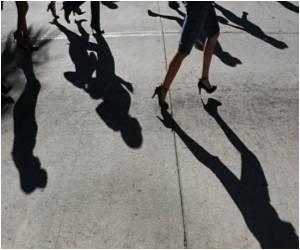African-American women living in more densely populated urban areas gain less weight.

The researchers assessed the association of women's residential environments with weight change and the incidence of obesity during a six year period of follow-up in the Black Women's Health Study. They focused on nearly 18,000 women who lived in the New York, Chicago or Los Angeles metropolitan areas. The women's residential neighborhoods were characterized by an "urbanicity score" considered dense urban neighborhoods.
They found that both six year weight gain and the incidence of obesity were lower among women who had high urbanicity scores as compared to those with low scores. Women who lived in suburban or rural neighborhoods were considered to have low urbanicity scores.
According to the researchers, a previous study of these women, found those who lived in denser neighborhoods walked more than women in more sprawling areas. "Policies that encourage more dense and urban residential development may have a positive role to play in addressing the obesity epidemic," said lead author Patricia Coogan, MPH, D Sc, a senior epidemiologist at the Slone Center and an associate professor of epidemiology at Boston University School of Public Health.
Source-Eurekalert









